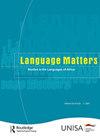超越“法绍达综合症”:卢旺达内战和非洲法语国家的政治
IF 0.8
3区 文学
0 LANGUAGE & LINGUISTICS
引用次数: 2
摘要
摘要本文以个案研究的方式,探讨法国人在非洲的政治活动。它考察了法国对卢旺达内战(1990-1994)的参与,并认为,将法语国家组织等机构概念化为“文化”机构,我们有可能模糊它们应有的政治功能。通过对法国殖民思想中的语言历史的思考,并将该历史翻译为后殖民时期的法语国家思想,文章展望了法国因其语言和文化的传播而获得的政治和经济利益。这篇文章也叙述了语言和文化在法国决定支持哈比亚利马纳政府的战争中所扮演的角色,这场战争最终导致了种族灭绝。最后,它论证了承认语言组织作为政治实体的重要性。本文章由计算机程序翻译,如有差异,请以英文原文为准。
Beyond “Fashoda Syndrome”: The Rwandan Civil War and the Politics of La Francophonie in Africa
Abstract This article uses a case study to interrogate the politics of French in Africa. It examines French involvement in the Rwandan Civil War (1990–1994), and argues that by conceptualising institutions such as La Francophonie as “cultural” bodies, we risk obscuring their properly political functions. Through a consideration of the history of language in French colonial thought, and the translation of that history into the post-colonial idea of francophonie, the article foregrounds the political and economic benefits that France has received as a result of the spread of its language and culture. The article also provides an account of the role played by language and culture in France's decision to support the Habyarimana government in a war that culminated in genocide. Ultimately, it argues for the importance of recognising linguistic organisations as political entities.
求助全文
通过发布文献求助,成功后即可免费获取论文全文。
去求助
来源期刊

Language Matters
Multiple-
CiteScore
1.20
自引率
0.00%
发文量
19
期刊介绍:
The purpose of Language Matters is to provide a journal of international standing with a unique African flavour focusing on multilingualism in Africa. Although the journal contributes to the language debate on all African languages, sub-Saharan Africa and issues related to multilingualism in the southern African context are the journal’s specific domains. The journal seeks to promote the dissemination of ideas, points of view, teaching strategies and research on different aspects of African languages, providing a forum for discussion on the whole spectrum of language usage and debate in Africa. The journal endorses a multidisciplinary approach to the study of language and welcomes contributions not only from sociolinguists, psycholinguists and the like, but also from educationalists, language practitioners, computer analysts, engineers or scholars with a genuine interest in and contribution to the study of language. All contributions are critically reviewed by at least two referees. Although the general focus remains on multilingualism and related issues, one of the three issues of Language Matters published each year is a special thematic edition on Language Politics in Africa. These special issues embrace a wide spectrum of language matters of current relevance in Southern Africa.
 求助内容:
求助内容: 应助结果提醒方式:
应助结果提醒方式:


